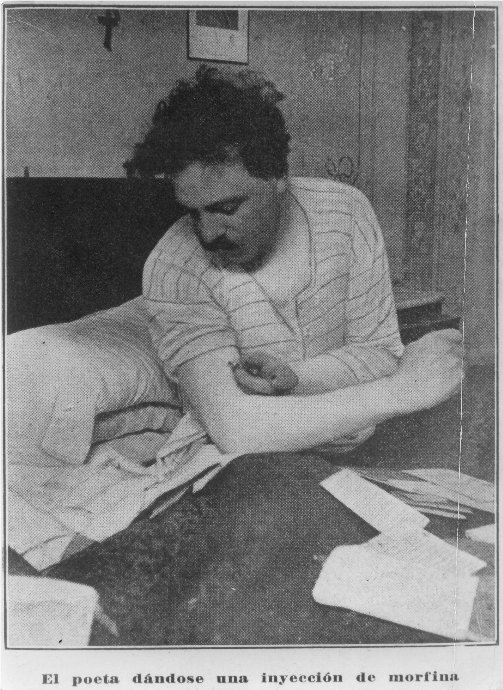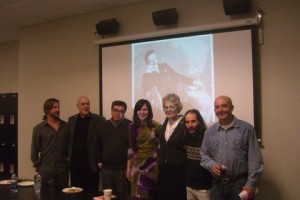
This year 2010 we commemorate the centennial of the death of Julio Herrera y Reissig, an Uruguayan Modernista poet who became an inspiration for several generations of Hispanic writers. His work was admired by authors such as Pablo Neruda, César Vallejo or Vicente Huidobro in Latin America, and by Miguel Hernández, Villaespesa and Cansinos-Assens in Spain, among others. His book Los peregrinos de piedra, published in 1914 by Garnier in Paris, circulated widely in both Spain and Latin America. This book was a reference for decadent style, and early critics of Herrera y Reissig emphasized his personality of damned poet. He was an early explorer of the use of drugs for literary creation in Latin America, and crafted a language that exerted a great deal of influence in Hispanic poetry during the 20th century.
Since the pioneer criticism of Guillermo de Torre early in the twenties, Herrera y Reissig was considered an innovator in the field of poetry; someone whose work on the poetic image contributed to the emergency of the Latin American avant-garde. De Torre argued that Julio Herrera y Reissig was the first to achieve the “extra-radial metaphor” (as this critic called the avant-gardist image in the Ultraista jargon that he himself had coined to describe the new poetic reality during the first half of the 20th century). Gwen Kirkpatrick in The Dissonant Legacy of Modernismo situated Herrera y Reissig as an introducer of the poetic practice of dissonance, leaving a legacy that radically transformed the poetic expression in Spanish during the 20th century. Attention has also being paid recently to Herrera y Reissig’s erotic prose —long time neglected by the literary criticism— in the work of recovery and analysis by Carla Giaudrone, Nilo Berriel and Aldo Mazzucchelli.
Homage to Julio Herrera y Reissig
Download Program

The Ph.D. Program in Hispanic and Luso-Brazilian Literatures and Languages will make an homage to Julio Herrera y Reissig on October 15, 2010 from 2:00 p.m. to 9:00 p.m. in room 5414. This event will gather a group of scholars who have recently focused on different aspects of Herrera y Reissig’s works: Gwen Kirkpatrick (Georgetown University), Óscar Montero (The Graduate Center, CUNY), Eduardo Espina (Texas A & M University), Aldo Mazzucchelli (Brown University), Carla Giaudrone (Rutgers University), Ernesto Estrella (Yale University), Marcos Wasem (The Graduate Center, CUNY) and Dr. Roger Santivañez (Bennington College).
Visit the photo set at Flickr
Forrest Gander has generously provided us with the most recent version of his translations of Julio Herrera y Reissig. Below you can read some excerpts from “Lunatic Tertulia”, and the sonnet “Sad Soul”:
Lunatic Tertulia
VESPERAS
Jam sol recedit igneus…
I.
In this gold crypt, somewhat shot,
A cataleptic fakir
In twilight sleep could partake here
Of a blessed Nirvana, somewhat shot. . .
Objectify an ill-wrought
Execution of thought,
And muffled rumor is begot
Like deaf remorse
From some extrorse
Diffusion of the music of a garrot.
Skies loosen their grimace, green,
And the disequilibrium
Of scorn’s satire hums,
Sick on absinthe, green . . .
Hypothetically, the sheen
In the moving horizon is spent,
And the pensive settlement
Is swarmed, they say, by a squall
As if, in the World’s thrall,
All was tenebrescent.
Already fireflies—witches
With jewels from Salambo—
Wink the “marche aux flambeaux”
Of a Sabbath of witches . . .
The velvet cypresses
Suggest a Carthusian ardor
Which wafts from your collar
In fragrant confidences,
Interjections of absences
And ring-eyed ritornellos of languor.
It’s all posthumous and abstract
And the spirit ideologues
Intimate monologues
Of the Unknowable Abstract . . .
The stupefied forest is ablaze
In an ecstasy of malaise,
And they light up that hirsute
Labyrinth of the proscenium
With a struck match from
The dark genie of the Absolute.
……………………………………………………………….
Its saddle hung up, the somnambulistic
Windmill metaphorizes that
A Don Quixote comes to combat,
On horseback and somnambulistic . . .
The smoke is vexed by an equilibrist,
Guignol of Kaleidoscope,
And in the heady night of dope
Savants tear open a lens
Of the eye of the conscience,
How deep! of a spectroscope.
On the watchtower, enigmatical,
The owl with eyes of brimstone
Suffers its morbid hoot-moan
Like a muezzin, enigmatical . . .
Before the omen—lunatic
Captious, spectral, denuded,
Velvety and muted—
It descends in stirless dress
Like a spider of death:
The immense night of the Buddha . . .
“Tertulia Lunática” by Julio Herrera y Reissig
Translated by Forrest Gander
Sad Soul
Everything was just so. A lilac malaise
stirred up the illusion of tomorrow
and onto its absurd page, a callow
heron drum-stroked choppy waves.
An enormous shuddering of Sybyls
epilepsied now and again the window,
when, whoosh, an addlepated myth rolled
through the dark behind my eyeballs.
“Bye, bye!” I screamed and into the sky,
the grey sarcasm of your svelte
glove rose with my red jealousy.
A jackdaw Wagnered through wind,
and at that instant the forest felt
an infinite and complex collision.
“Alba Triste” by Julio Herrera y Reissig
Translated by Forrest Gander
……………………………………………………………………………………………….
This activity is possible thanks to the generous support of:
The Graduate School and University Center, CUNY
The Ph.D. Program in Hispanic and Luso-Brazilian Literatures and Languages
Doctoral Students Council
Asociación de Estudiantes Latinos y Latinoamericanos (AELLA)
The Poetics Group
Grupo de Estudios Colombianos
Consulado General del Uruguay en Nueva York



